There are many natural fertilizers you can use to fertilize indoor plants…
… and you may be considering using some of them.
There is a question about whether coffee grounds can be used to fertilize indoor plants…
Hear it from Ferb!
Throughout my beginner years of being a gardener…
I fertilize my plants with store-bought ones…
As they are easy to get and doesn’t need lots of time to apply…
But as I got more aware of the environmental friendly ones…
… such as the home-made fertilizers from different materials…
… I got more creative and opt for them instead!
I’ve used egg shells, compost, and lately, coffee grounds!
Indeed! Coffee grounds can be used as fertilizers!
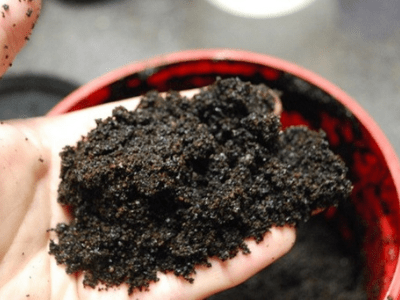
It is best to make compost first from coffee ground before you use them to fertilize inside plants…
By directly putting coffee ground on plant soil, excessive moisture can build up…
… fungus can come to the surface, and the plant can be stunted.
You can use coffee ground to provide nutrients that indoor plants can use effectively…
… and also as a cost-effective fertilizer.
Learn how to utilize them effectively…
… while not damaging your house plants.
Why Use Coffee Grounds To Fertilize Indoor Plants?
People often throw away coffee ground, which contain plenty of nutrients, into the garbage…
They are widely available, free, and contain high nitrogen levels, essential to the growth of plants…
Coffee is also known to contain magnesium and potassium, nutrients that plants require for optimal growth (Nelson, 2013). Though incorporating coffee grounds into the soil while planting is mentioned, it is suggested that brewed coffee, diluted with water (to look like a weaker tea) has been the most successful in facilitating plant growth.
Plant Growth in Response to Presence of Ground Coffee by Bates College
Coffee ground can also be used to water indoor plants, decreasing household waste production…
The whole idea of using coffee ground to fertilize indoor plants is not anything new…
People have used coffee ground on their gardens for years with good results…
We shall see that this is definitely something you should consider…
… but there are significant issues with their use.
The Best Ways To Use Coffee Grounds To Fertilize Indoor Plants
Some people might think it’s fine to add coffee ground…
… directly to the top of their plants’ soil, but this can cause them several problems.
There are three great ways to use coffee ground as a fertilizer for indoor plants…
Use Coffee Grounds to Make Compost
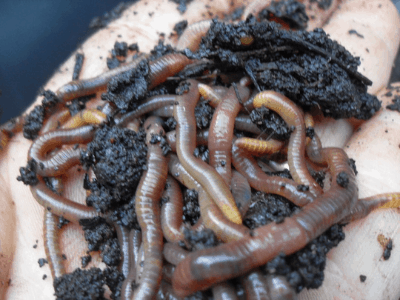
Using coffee ground as compost is by far the most efficient way to use them…
Your compost pile will be ready to use once your used coffee grounds are added…
Most indoor plants are native to tropical climates…
… where their primary source of nutrition comes from decayed organic matter…
… produced by the dense vegetation around and above them.
The natural process of making compost is replicated in the compost you make at home…
… and will deliver abundant nutrients for healthy houseplant growth.
Coffee ground have a high nitrogen content (NPK 2.1-0.3-0.3)…
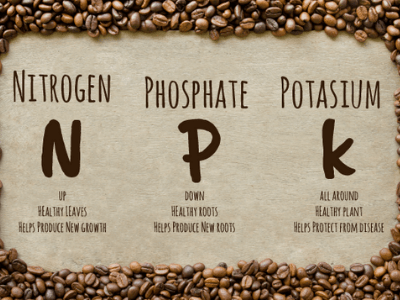
… that will be balanced out by the other ingredients in your compost.
When repotting, you can either apply this compost to the top of the soil…
… or mix it into the top few inches of the soil.
Some people have concerns about the smell from compost…
… that was made at home on their houseplants, which is why they refuse to use it.
According to my experience, this is not a problem…
Any smell produced by compost tends to dissipate very quickly…
… and can largely be avoided by working the compost into the soil.
When using home made compost on your house plants, two things should be kept in mind…
You should limit the amount of compost you add to the pot to a maximum of one inch…
… to prevent foliage burn and symptoms of nutrient toxicity.
Second, as compost is rich in organic matter, it naturally retains water…
… which can increase the risk of over-watering.
Take this into account when watering to avoid problems…
Make Liquid Coffee Houseplant Fertilizer
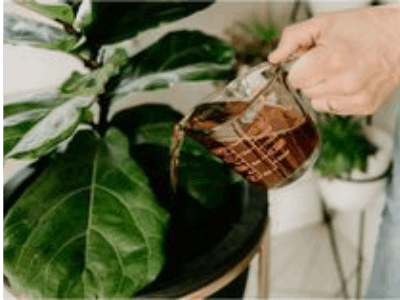
You shouldn’t pour coffee directly on the soil of your indoor plants…
… but you can make a compost tea with your coffee ground that will do wonders for your plants.
It’s simple to make compost tea with coffee ground…
Simply place them in a container full of water, and let them soak for 1-2 weeks, stirring them every few days…
Once the coffee starts to deteriorate, it releases nutrients and facilitates the growth of beneficial bacteria…
The water then can be strained through cheesecloth for use as water for plants…
You will also add beneficial bacteria by doing this…
… which will improve the health of your soil and your plants.
Add Coffee Grounds to the Potting Mix When Repotting
Due to the organic nature of coffee ground…
… they release their nutrients slowly as they decompose in the soil.
By mixing the ground with your regular potting mix…
… you can use coffee ground as a slow release fertilizer.
Despite the difficulties associated with doing this…
… it can provide a continuous source of nutrients for up to six months, depending on the plant.
Coffee grounds can make a natural house plant fertilizer…
… but they have to be used correctly if you want the best results.
Compared to phosphorus and potassium…
… the nitrogen in coffee grounds is much greater than that in grains.
If you only use coffee grounds to fertilize your plants…
… plants with relatively large phosphorus and potassium requirements…
… may not perform as well as they should.
I will talk about the problems associated with using coffee grounds in your potting mix in the next section…
Problems With Using Coffee Grounds To Fertilize Indoor Plants
We’ve discussed several ways in which coffee grounds may be used to fertilize an indoor plant…
… but we should also discuss the negative aspects in more detail.
Excess Moisture Retention
Coffee grounds are particularly good at retaining moisture…
They hold on to moisture in the soil because of their fine particles and organic nature…
One of the most common problems for people caring for indoor plants is overwatering…
… so this is a major negative.
By adding coffee grounds to the soil, you greatly increase the risk…
… of over-watering your houseplants, and this can spell disaster for your plants.
You can reduce the risk of overwatering your indoor plants…
… if you do use coffee grounds on a direct basis or as part of a compost in the soil that you use.
When soil is amended with more coarse sand or perlite…
… it will become draining, allowing the soil to dry out faster…
… and reduce the chances of over-watering and root rot.
A smaller pot or a more porous pot may reduce the risk of overwatering…
… while they will also allow the soil to dry more quickly.
Promotes Fungal Growth
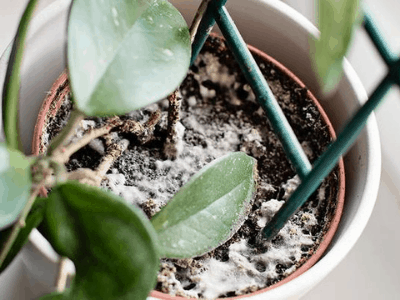
This is a bigger issue if you add coffee grounds directly to the surface of your houseplants’ soil…
Those grounds can serve as an ideal breeding ground for fungal organisms…
… causing them to infect your plants with fungal diseases.
It is particularly disappointing…
When you try to cultivate healthy plants and feed them…
… only to cause a fungal disease that can do considerable damage.
You can reduce this problem by making sure the coffee grounds are fully incorporated into the soil…
Ideally, using coffee grounds compost or adding coffee grounds when repotting will reduce this risk…
Attracts Pests
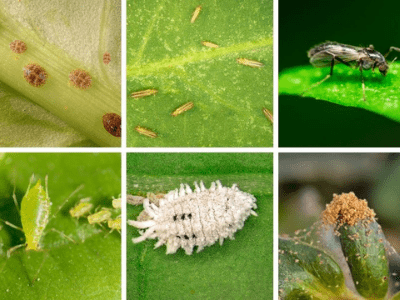
Although some pests may be deterred by coffee grounds…
… many of them will be attracted by the conditions…
… that coffee grounds create in the soil of your houseplants.
In my opinion…
This demonstrates why adding coffee grounds to the surface of the soil is not recommended…
Composting coffee grounds is by far the best option…
… if you want to use coffee grounds to fertilize indoor plants.
Slowed Growth
It has been shown that adding coffee grounds directly to the soil…
… can actually hinder plant growth, especially for young saplings and young plants.
There is a strong possibility that this is due to the caffeine content in coffee grounds…
There does not appear to be any evidence that using coffee grounds to make compost causes the same problem…
… so again this looks to be the best option for using coffee grounds to fertilize your indoor plants.
There Are Much Better Alternatives
As a result, using coffee grounds for fertilizing houseplants is not the best way to go…
Many natural or synthetic fertilizers can be used on your plants…
… and you are probably better off using coffee grounds on your outdoor plants…
… or making use of this kitchen waste in another manner.
Most local authorities now collect kitchen and garden waste separately from all other waste from residents…
Local authorities can reuse this composted organic waste in more appropriate areas by recycling it…
To sum it up…
However, you should avoid the difficulties that come with using coffee grounds as fertilizer for indoor plants…
My recommendation is that you fertilize your outdoor garden with coffee grounds…
… and your houseplants with other alternatives.
You can much more likely have a positive outcome…
… if you make compost or a compost tea from coffee grounds.
Conclusion
There are still many recent and interesting articles about Snake Plants..
..as well as other unique information from All Things Gardener..
Check out more of our posts like this one here!
I hope you can now take care your snake carefully and grow it big!
Thanks for reading this article! Bye!

